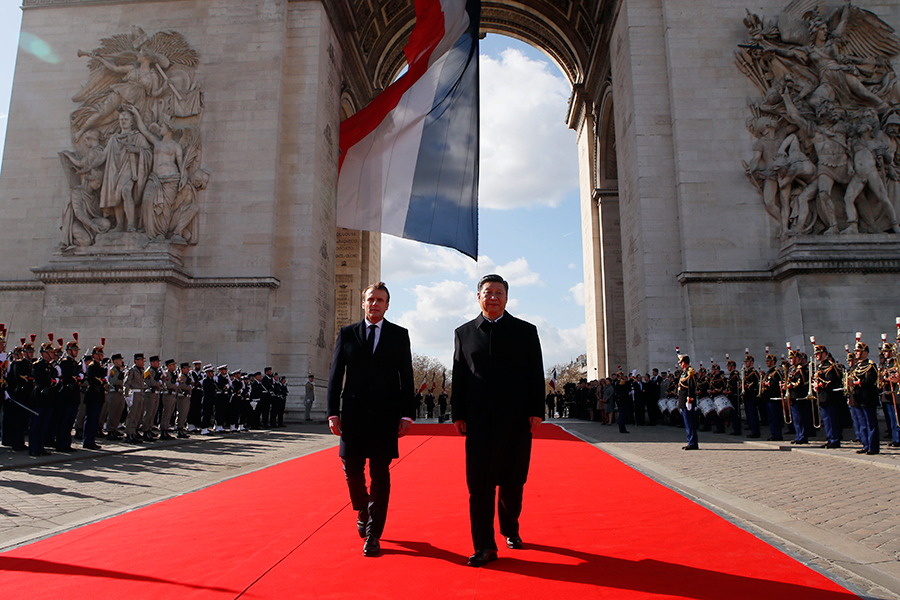China-France in the friend zone


In times of global uncertainty, when EU is undergoing an unprecedented political and social crisis, the 2019 state visits of President Xi Jinping to Italy, Monaco and France are the first biggest diplomatic events of the year in the old continent.
Although there are as many reasons behind China's rise and its implications for Europe as there are European cultures and national histories having particular ties with China, the Europe visit of Chinese president should reinforce the consistence of dialogue on shaping EU-Asia connectivity in the long run. Indeed, the EU-Asia connectivity is obviously one of the main pillars of the policy making process about the new multilateral order expectations as well as talks on WTO reform.
Common ground
In this regard, Xi's state visit in France is of special importance to Emmanuel Macron since Paris is asserting itself as the European political driving force under his leadership. On March 26, the meeting on investments and climate issues at the Elysee with the participation of Angela Merkel and Jean-Claude Juncker shows the rising role of France in the new EU-China dialogue, which should be fair and confidence-based, according to the Elysee. This feeling of urgency is not necessarily shared by all the French people, who are more focused on the impoverishment for over 30 years. But this fear to be a victim of the new international order has never really disappeared since the election of Macron in 2017.
In particular, the changing world balance is creating new opportunities, which a few years ago would have been unbelievable. As the French ambassador said in the review China Today (French edition) in March 2019, China is a friendly country and, as a permanent member of the Security Council, a responsible partner, which greatly helps to tackle the global challenges. In the field of international cooperation against terrorism, China has invested 40 million euros in favor of the G5 Sahel in January 2019, a major issue for EU and France. Moreover, France is the first country to have established cooperation with China in Senegal and in South-East Asia in the frame of the Belt and Road Initiative through an agreement between Agence Fran?aise de Développement and China Development Bank in January 2018.
Macron in tune with people on China
According to a survey conducted by Kantar Public in September 2018, 27 percent of the French people now consider China as an ally and 25 percent have a neutral opinion. Among the positive opinion, French people aged under 35 and over 55 are the most significant part. In the same time, a rising distrust of the United States radiates in the French society more broadly: 35 percent consider US as an opponent and 39 percent as an ally. Thus, the survey shows a new trend, in which China and United States have the same level of trust and distrust but with some higher expectations for China nowadays and in the future. Indeed, according to the same survey, a large majority consider the French-Chinese relationship in a positive way in terms of culture (48 percent), diplomacy (44 percent) and economy (36 percent and 45 percent for people aged under 35). Here, the new French generation aged under 35 is much more positive to Chinese investments in France (43 percent) while the generation aged over 50 is more hostile (59 percent). Generally speaking, Chinese people in France are very appreciated in terms of tourism (78 percent) and as a community itself (55 percent).
This kind of benevolent neutrality in the French public opinion toward China is perfectly embodied by Macron. Furthermore, since the 2015 Paris Agreement on climate change and the announcement of Donald Trump to back out of this global agreement in June 2017 the French president has developed the “green diplomacy” as a powerful tool of non-alignment policy, which is now fully integrated in the foreign policy of France and EU but also China. The benevolent neutrality associated with the non-alignment policy of the “green diplomacy” backed by Macron is creating a new political course together with all the willing countries and in first place with China.
Global governance through multilateral ecosystem
Since the first official journey of Xi in France in 2014, the international situation has changed dramatically. The 55 years of the establishment of diplomatic relations between China and France remind us the strong ties we have maintained and the new one we need to develop further. Indeed, the 2019 state visit of Xi in France is of special importance not only in economic terms but above all in political terms. The second meeting of the French and Chinese presidents follows on the heels of the first one in January 2018, since both of them are lead with worldwide values. Macron embodied a hope for the revival of European Union. These two projects have a common ground, i.e. building the multilateralism of the 21st century. The main issue in Paris lies in the creation of a multilateral ecosystem based on the cooperation in the field of human right, social justice, sustainable development, innovation and intellectual property. This multilateral ecosystem should pave the way of a new global governance, where the international law should prevail for solving conflicts and ecological issues.
Therefore, the meeting in Paris could strengthen the key role of Macron and Xi in shaping a new global governance under the banner of China and EU. The next China-EU summit in April 2019 in Brussels and Macron's state visit to China this year should be followed closely. More than a necessity or reason-based choice, the China policy of Macron lies in his strength of conviction.
The author is research fellow in international relations at Paris 10 University.
































